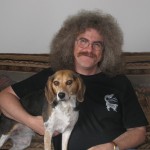Cold-Scented Nose
April 14, 2015Based on a photograph of the custody battle for the hound dog, Wolf, April 4, 1956, Michigan City, Indiana Because sometimes two people don’t understand each other. Because one…
Based on a photograph of the custody battle for the hound dog, Wolf, April 4, 1956, Michigan City, Indiana
Because sometimes two people don’t understand each other. Because one says rain, the other, goldfish fin in the bark. Of trees, it seems apparent that the souls of llamas pass through many woods. Stand their Peruvian selves upright in their own shade when they have left the protective cover of seven, maybe eight, woolen years. In dog years, that’s middle age. In hound years, something is always alive. Even when two men can’t resolve whether the pup hunts this Indiana woods or that, something is alive. In their voices. Their throat. As if the baying says what troubles the black branches of the north is that two men have two eyes each. That each eye contains precisely two spokes. One spoke dark, the other blight. Lord knows we wish we could have been there. In the courtroom. In the simple this and that of black and white. The surety of right and wrongly right. In April of 1956. Eight months before snow was born. Into one another, we pour our silky hound selves, like hound-trot through woods. Like a cold-scented nose tracking back the rebirth of Indiana trees to coca leaves and a mountain pass in Peru. After sitting on the witness stand, it is said, the hound snoozed and wagged his tail through most of the trial, showing no concern over man’s legal ways. Could it be because Michigan borders Indiana but is Indiana? That a backwoods town borders a city but is a city? At least in Indiana. In Michigan City. At least in 1956. In a black and white April. When this way and that was all that could be seen. Even the forty-eight stars on the American flag draped on the wall behind the judge can be divided evenly in two. The way coonhound can be one word or more, depending on the depth of the drawl. The way rain can be rain or the goldfish splinter in the shagbark of an elm. Joe Patton, I understand, got custody of the hound. Spent many a fire by the night of his sorry for this, his plenty for that. If I was John Burke, the Justice of the Peace, I’d make Justice of the Peace one word, not four. Cause four, too, can be divided evenly by any spat tongue claiming the mouth not enough. Even when it wags its way into a new body at birth, traveling through many moods, bringing all the with it. Yes, all the with it, the way life to life we say the width of what worlds we may have previously seen. God, the courtroom is a dark voice, or the mud years of a hound dragging its ears through the long even hearing of a swamp. Unsettling the woods of all its coon-shiver leaves. In sycamore and sassafras hollows. In April. The simple this of black. In 1956. The width, simply, of white. The way courtroom can be one word. Or two.
–George Kalamaras (Allen County)
This poem previously appeared in Map Points, Winter 2015, Volume 1, Issue 2.

George Kalamaras, of Fort Wayne, is current Poet Laureate of Indiana and the author of fourteen books of poetry, seven of which are full-length. Two recent books are Kingdom of Throat-Stuck Luck, winner of the Elixir Press Poetry Prize (2011) and The Mining Camps of the Mouth (2012), winner of the New Michigan Press/DIAGRAM chapbook award. He is Professor of English at Indiana University-Purdue University Fort Wayne, where he has taught since 1990.
Indiana Humanities is celebrating National Poetry Month by sharing a poem from an Indiana poet every day in April (hand-selected by Indiana Poet Laureate George Kalamaras). Check in daily to see who is featured next!


